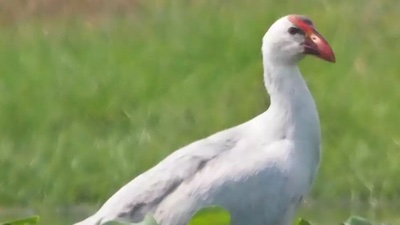Swamphen
This is a collection of articles archived for the excellence of their content. Additional information may please be sent as messages to the Facebook community, Indpaedia.com. All information used will be gratefully acknowledged in your name.
This is a collection of articles archived for the excellence of their content. |
White Grey-headed Swamphen
2022
Minati Singha, May 5, 2022: The Times of India

From: May 5, 2022: The Times of India

From: May 5, 2022: The Times of India
Bhubaneswar: Odisha is home to the only white grayheaded swamphen in the world. It is to be found in the Mangalajodi wetland, on the northern edge of the Chilika lagoon.
The finding was published in the prestigious “Wilson Journal of Orinthology” as an online early article titled “First report of diluted plumage in gray-headed swamphen (Porphyrio poliocephalus) and a review of colour aberrations in swamphens” on May 3. A three-member research team comprising honorary wildlife warden of Khordha Subhendu Mallik, associate professor at Sri Sri University Shakti Nanda and assistant conservator of forests Ashutosh Mallik identified the bird.
This rare bird has an almost all-white plumage because of genetic dilution. But it has coloured eyes, a common characteristic of the swamphen species. On the other hand, the gray-headed swamphen or purple swamphen (Porphyrio poliocephalus) is found in large marshes and reed beds bordering lakes across the country. This hensized bird is purplish-blue in colour, has a large red bill, a red frontal shield and white undertail covers.
Experts believe identifying plumage aberrations in the field can be very difficult due to several factors, such as distance from the bird, its movement, proper lighting, and whether the bird is already strongly bleached by the light. “The reviewers had many queries on the sighting and other details, which we were able to address successfully,” Subhendu said